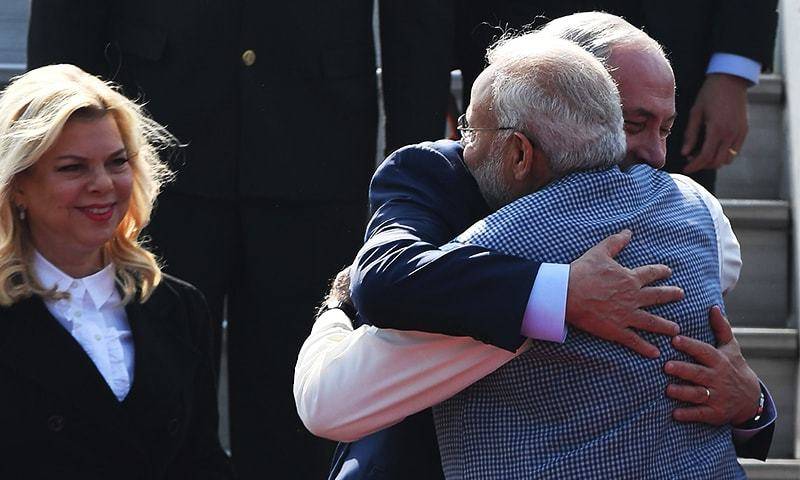Prime Minister Benjamin Netanyahu arrived in New Delhi on Sunday for the first visit by an Israeli leader to India in 15 years, promising closer ties with the regional power.
The visit marks 25 years since India and Israel established diplomatic relations, but comes just weeks after India voted in favour of a United Nations resolution denouncing United States President Donald Trump's recognition of Jerusalem as Israel's capital.
Netanyahu and his wife Sara were welcomed at the international airport in New Delhi by Indian Prime Minister Narendra Modi who made history in July 2017 when he became the first Indian leader to visit Israel.
Netanyahu will be only the second Israeli PM to visit India and the first since Ariel Sharon in 2003.
Modi ─ who will accompany Netanyahu for large parts of his tour ─ embraced the Israeli prime minister on the tarmac before the pair set off to pay homage at a war memorial in the Indian capital.
The Israeli leader will later meet with Foreign Minister Sushma Swaraj before a private dinner with Modi.
Netanyahu's office put out an announcement saying that Modi's greeting was a “surprise welcome” because a Cabinet minister had been scheduled to attend instead.
“I very much appreciate the gesture,” Netanyahu said.
“Your visit to India is historic and special. It will further cement the close friendship between our nations,” Modi said on Twitter.
Bibi's agenda
During Netanyahu's six-day stay the two countries are expected to sign agreements on cybersecurity, energy and space cooperation and film production, India's External Affairs Ministry said.
They're also expected to review progress in implementing agreements on cooperation in technology, water and agriculture that were signed during Modi's visit to Israel.
“This visit is an opportunity to enhance cooperation with a global economic, security, technology and tourism power,” Netanyahu had said in a statement ahead of his visit.
“Indian Prime Minister Modi is a close friend of Israel and of mine.”
Netanyahu is accompanied by the largest-ever business delegation to travel with an Israeli leader.
Executives in technology, agriculture and defence are among those making the journey as Tel Aviv pursues deals with Asia's third-largest economy.
On Monday, Netanyahu will have formal discussions with Modi and call on President Ram Nath Kovind as well as attend an India-Israel CEO Forum Meeting.
Netanyahu expects to make a stop at the Taj Mahal, a visit to Modi's home state of Gujarat and meet with Bollywood luminaries in Mumbai where he will attempt to market Israel as a prime filming location.
He will also make an emotional visit to a Jewish centre targeted in the 2008 Mumbai attacks during his tour, a symbolic gesture to India's tiny and shrinking Jewish community.
Netanyahu will accompany 11-year-old Moshe Holtzberg as the boy returns for the first time to the house where his parents were killed in the attacks that left 166 people dead.
Daniel Carmon, the Israeli ambassador to India, played down India's vote at the UN, describing the relationship as "much stronger than one vote at the UN", adding that Israeli-India ties would withstand any troubles.
“The relationship is an all-weather relationship,” he told reporters Friday, adding it was “so strong and so important to both countries that our feeling is that nothing can reverse it.”
He said Netanyahu was bringing with him 130 businesspeople, “which reflects the enthusiasm in Israel to do more business with India.”
India-Israel ties
Bilateral trade between the countries has skyrocketed from $200 million in 1992, when India and Israel established diplomatic ties, to $4.16 billion in 2016.
But that remains far below Israel's nearly $40bn in annual trade with its largest partners, the United States and the European Union.
Still there are irritants in the growing relationship.
The build up to Netanyahu's visit was soured this month when India called off a deal to buy 8,000 anti-tank guided missiles from Israel's state-owned defence contractor Rafael.
The Indian army and the government are discussing ways to revive the $500 million order, which was scrapped when the country's own state-run defence contractor offered to build similar missiles locally.
Israel is a major weapons supplier to India, exporting an average of $1bn of military equipment each year, but Modi wants to end India's status as the world's top defence importer.
During the Cold War, India didn't have open relations with Israel, leaning heavily in favour of the Palestinians.
But over the past quarter century, the two countries have developed close ties.






